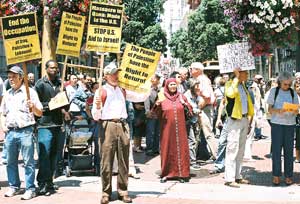Oakland police spied on anti-war, labor groups
By
Joan Marquardt
Oakland, Calif.
Published Aug 14, 2006 9:07 PM
The Northern
California office of the American Civil Liberties Union made public a report
July 27 that exposed post-9/11 government surveillance by police, the military
and a state security agency on individuals, labor unions and anti-war groups who
opposed the U.S. war against Iraq.
|
San Francisco Aug. 5 protest demanding
‘U.S. out of the Middle East.’
WW photo: Joan Marquardt
|
It turns out that two Oakland police
officers were assigned to infiltrate a local anti-war organization—Direct
Action to Stop the War.
Established under the direction of the California
attorney general’s office, the California Anti-Terrorism Information
Center issued a specific advisory five days before the anti-war
organization’s April 7, 2003, “National Day of Action” protest
demonstration at the Port of Oakland.
Criminal intelligence specialist
Mike Mendenhall, listed as the law enforcement contact, was well-informed about
the details of the planned demonstration because the two undercover cops were
reportedly functioning by then in leadership positions within the anti-war
group, enabling them to provide details of the organization’s
plans.
The Oakland police had also monitored online postings by the
International Longshore and Warehouse Union because of its anti-war stance. The
longstanding progressive record of the ILWU workers is well-known.
On the
day of the Port of Oakland protest, hundreds of anti-war activists blocked gates
at the docks to protest two shipping companies that they said were profiting off
the war on Iraq. Eyewitnesses reported that police shot at demonstrators and
onlookers—including dockworkers—with wooden bullets,
“beanbags” and concussion grenades. Scores were wounded, many in the
back.
In response to the unprovoked police brutality, many angry longshore
workers walked off the job.
At a demonstration the following month, on May
12, police violence against the protesters caused broken bones and other serious
injuries. This is well-documented in eyewitness and photographic detail. A
subsequent lawsuit brought against the City of Oakland by injured anti-war
protesters and dockworkers on their way to their jobs was settled for about $2
million.
Months after the demonstrations, to add further insult to these
injuries, Oakland Deputy Police Chief Howard Jordan was quoted in a transcript
from the city police review panel saying that “our ability to gather
intelligence on these groups and this type of operation needs to be
improved.” And he added:
“I don’t mean same-day
intelligence. I’m talking about long-term intelligence
gathering.”
On the same day the ACLU report became public, ILWU
member Jack Heyman, a participant in the May 17, 2003, Port of Oakland anti-war
protest, issued a statement that read in part: “The trade union movement,
and particularly the International Longshore and Ware house Union, has faced
this kind of ‘iron heel’ policy from the government during the 1934
San Francisco General Strike and during witch hunts of the now-infamous McCarthy
period.
“Since Sept. 11, 2001, the U.S. government, under the
rubric of fighting the ‘war on terror,’ has ratcheted up port
security measures, threatening to occupy the docks with troops in all ports of
the West Coast during 2002 longshore contract negotiations.
“In
2003, at the start of the Iraq war, anti-war protesters in the Port of Oakland
and longshoremen going to work at marine terminals were shot with
‘non-lethal’ weapons.
“But it will take more than
monetary settlements or new laws to defend our civil liberties during this
climate of fear and pork-barrel funding for ‘homeland
security,’” Heyman concluded. “Defending our democratic rights
means exercising those rights in mass demonstrations. That’s how civil
rights were won in this country and the Vietnam War was stopped.”
Articles copyright 1995-2012 Workers World.
Verbatim copying and distribution of this entire article is permitted in any medium without royalty provided this notice is preserved.
Workers World, 55 W. 17 St., NY, NY 10011
Email:
[email protected]
Subscribe
[email protected]
Support independent news
DONATE


